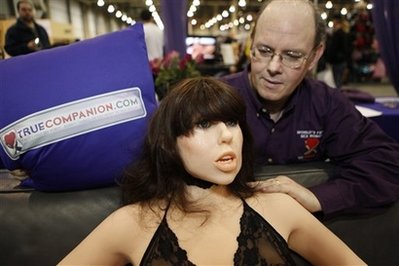 A New Jersey company says it has developed “the world’s first sex robot,” a life-size rubber doll that’s designed to engage the owner with conversation rather than lifelike movement. At a demonstration at the Adult Entertainment Expo in Las Vegas on Saturday, the dark-haired, negligee-clad robot said “I love holding hands with you” when it sensed that its creator touched its hand.
A New Jersey company says it has developed “the world’s first sex robot,” a life-size rubber doll that’s designed to engage the owner with conversation rather than lifelike movement. At a demonstration at the Adult Entertainment Expo in Las Vegas on Saturday, the dark-haired, negligee-clad robot said “I love holding hands with you” when it sensed that its creator touched its hand.
Another action, this one unprintable, elicited a different vocal response from Roxxxy the robot. The level of sophistication demonstrated was not beyond that of a child’s talking toy, but Roxxxy has a lot more brains than that — there’s a laptop connected to cables coming out of its back. It has touch sensors at strategic locations and can sense when it’s being moved. But it can’t move on its own, not even to turn its head or move its lips. The sound comes out of an internal loudspeaker.
Douglas Hines, founder of Lincoln Park, N.J.-based True Companion LLC, said Roxxxy can carry on simple conversations. The real aim, he said, is to make the doll someone the owner can talk to and relate to.
“Sex only goes so far — then you want to be able to talk to the person,” Hines said.
The phrases that were demonstrated were prerecorded, but the robot will also be able to synthesize phrases out of prerecorded words and sounds, Hines said. The laptop will receive updates over the Internet to expand the robot’s capabilities and vocabulary. Since Hines is a soccer fan, it can already discuss Manchester United, he said. It snores, too.
Owners will also be able to select different personalities for Roxxxy, from “Wild Wendy” to “Frigid Farrah,” Hines said. He’s charging somewhere from $7,000 to $9,000 for the robot, including the laptop, and expects to start shipping in a few months.
A Japanese company, Honey Dolls, makes life-size sex dolls that can play recorded sounds, but Roxxxy’s sensors and speech capabilities appear to be more sophisticated. Hines’ goals are certainly more far-reaching.
An engineer, Hines said he was inspired to create the robot after a friend died in the Sept. 11, 2001, terror attacks. That got him thinking about preserving his friend’s personality, to give his children a chance to interact with him as they’re growing up. Looking around for commercial applications for artificial personalities, he initially thought he might create a home health care aide for the elderly.
“But there was tremendous regulatory and bureaucratic paperwork to get through. We were stuck,” Hines said. “So I looked at other markets.”
The broader goal of the company is still to take artificial personalities into the mainstream, beyond sex toys, Hines said.
“The sex robot thing is marketing — it’s really about making a companion,” he said.
In a 2007 book, “Love and Sex with Robots,” British chess player and artificial intelligence expert David Levy argues that robots will become significant sexual partners for humans, answering needs that other people are unable or unwilling to satisfy.


